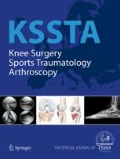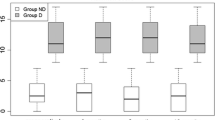Abstract
Purpose
The hypothesis of this study was that depressive patients feel more pain in the immediate TKA postoperative period in comparison with non-depressed patients.
Methods
The diagnosis of depression was made with the Geriatric Depression Scale Short Form. The Visual Analogic Score (VAS) was registered each 8 h during the first 3 days. The mean and maximum VAS and the number of analgesic rescues required in this period were calculated in 803 consecutive TKAs. The Knee Society Score (KSS), the Western Ontario McMaster Universities Osteoarthritis Index (WOMAC), and the Short Form-36 (SF-36) scores were obtained preoperatively and at the 1-year follow-up.
Results
Forty-eight (6%) of these patients were considered depressed. The results obtained in the depressed patients and non-depressed were, respectively, mean VAS (2.0 vs 1.0, p = 0.00), maximum VAS (5.3 vs 1.6, p = 0.00), and number of rescues needed (4.4 vs 1.8, p = 0.00). Although depressed patients scored worse in the functional and quality of life scores in the preoperative period, the improvement obtained (1-year outcomes minus preoperative outcomes) in the different scores was similar in both groups with the exception of the mental domain of the SF-36, which improved further in depressed patients (p = 0.00).
Conclusion
Depressed patients feel more pain in the immediate postoperative period. However, the improvement obtained in functional and referred quality of life scores is similar to non-depressed patients.
Level of evidence
II.
Similar content being viewed by others
References
Alonso J, Prieto L, Antó JM (1995) The Spanish version of the SF-36 Health Survey (the SF-36 health questionnaire): an instrument for measuring clinical results. Med Clin (Barc) 104(20):771–776
Alonso J, Regidor E, Barrio G, Prieto L, Rodriguez C, de la Fuente L (1998) Population reference values of the Spanish version of the Health Questionnaire SF-36. Med Clin (Barc) 111(11):410–416
Ares O, Castellet E, Maculé F, León V, Montañez E, Freire A, Hinarejos P, Montserrat F, Amillo JR (2013) Translation and validation of “The Knee Society Clinical Rating System” into Spanish. Knee Surg Sports Traumatol Arthorsc. 21(11):2618–2624
Bellamy N, Buchanan WW, Goldsmith CH, Campbell J, Stitt LW (1988) Validation study of the WOMAC: a health status instrument for measuring clinically important patients-relevant outcomes following total hip or knee arthroplasty in osteoarthritis. J Orthop Rheumatol 1:95–108
Bistolfi A, Bettoni E, Aprato A, Milani P, Berchialla P, Graziano E, Massazza G, Lee GC (2015) The presence and influence of mild depressive symptoms on postoperative pain perception following primary total knee arthroplasty. Knee Surg Sports Traumatol Arthrosc. doi:10.1007/s00167-015-3737-y
Escobar A, Quintana JM, Bilbao A, Azkárate J, Güenaga JI (2002) Validation of the Spanish version of the WOMAC questionnaire for patients with hip or knee ostehoarthritis. Clin Rheumatol 21(6):466–471
Eymard F, Charles-Nelson A, Katsahian S, Chevalier X, Bercovy M (2016) Predictive factors of “Forgotten Knee” acquisition after total knee arthroplasty: long-term follow-up of a large prospective cohort. J Arthroplasty. doi:10.1016/j.arth.2016.06.020
Filardo G, Merli G, Roffi A, Marcacci T, Barti Ceroni F, Raboni D, Bortolotti B, Kon E, Marcacci M (2016) Kinesophobia and depression affect total knee arthroplasty outcome in a multivariate analysis of psychological and physical factors on 200 patients. Knee Surg Sports Traumatol Arthrosc. doi:10.1007/s00167-016-4201-3
Gerbershagen HJ, Aduckathil S, van Wijck AJ, Peelen LM, Kalkman CJ, Meissner W (2013) Pain intensisty on the first fay after surgery: a prospective cohort study comparing 179 surgical procedures. Anesthesiology 118(4):934–944
Giesinger K, Hamilton DF, Jost B, Holzner B, Giesinger JM (2014) Comparative responsiveness of outcome measures for total knee arthroplasty. Osteoarthritis Cartilage 22(2):184–189
Gold HT, Slover JD, Joo L, Bosco J, Iorio R, Oh C (2016) Association of depression with 90-day hospital readmission after total knee joint arthroplasty. J Arthroplasty. doi:10.1016/j.arth.2016.04.010
Gong L, Chen H (2014) Descripitve analysis of the cost-effectiveness of depressed patients undergoing total knee arthroplasty: an economic decision analysis. J Orthop Sci 19(5):820–826
Grosu I, Lavand´homme P, Thienpont E (2014) Pain after knee arthroplasty: an unresolved issue. Knee Surg Sports Traumatol Arthorsc 22(8):1744–1758
Hirschmann MT, Iranpour F, Konala P, Kerner A, Rasch H, Cobb JP, Friederich NF (2010) A novel standardized algorithm for evaluating patients with painful total knee arthroplasty using combined single photon emission tomography and conventional computerized tomography. Knee Surg Sports Traumatol Arthrosc 18(7):939–944
Hirschmann MT, Testa E, Amsler F, Friederich NF (2013) The unhappy total knee arthroplasty (TKA) patient: higher WOMAC and lower KSS in depressed patients prior and after TKA. Knee Surg Sports Traumatol Arthrosc 21(10):2405–2411
Insall JN, Dorr LD, Scott RD, Scott WN (1989) Rationale of the Knee Society clinical rating system. Clin Orthop Relat Res 248:13–14
Keats AS (1978) The ASA classification of physical status—a recapitulation. Anesthesiology 49(4):233–236
Kurtz S, Ong K, Lau E, Mowat F, Halpern M (2007) Projections of primary and revisions hip and knee arthroplasty in the United States from 2005 to 2030. J Bone Joint Surg Am 89(4):780–785
Lavernia CJ, Villa JM, Iacobelli DA (2015) What is the role of mental health in primary total knee arthroplasty? Clin Orthop Relat Res 473(1):159–163
Lesher EL, Berryhill JS (1994) Validation of the geriatric depression scale-short form among in patients. J Clin Psychol 50(2):256–260
Lewis GN, Rice DA, McNair PJ, Kluger M (2015) Predictors of persistent pain after total knee arthroplasty: a systematic review and meta-analysis. Br J Anaesth 114(4):551–561
Naal FD, Impellizzeri FM, Lenze U, Wellauer V, von Eisenhart-Rothe R, Leunig M (2015) Clinical improvement and satisfaction after total joint replacement: a prospective 12-month evaluation on the patients´ perspective. Qual Life Res 24:2917–2925
Ortega R, Salinero MA, Kazemzadeh A, Vidal S, de Dios R (2007) Validation of 5 and 15 items Spanish version of the geriatric depression scale in elderly subjects in primary health care setting. Rev Clin Esp 207(11):559–562
Pérez-Prieto D, Gil-González S, Pelfort X, Leal-Blanquet J, Puig-Verdié L, Hinarejos P (2014) Influence of depression on total knee arthroplasty outcomes. J Arthroplasty 29(1):44–47
Riddle DL, Perera RA, Nay WT, Dumenci L (2015) What Is the Relationship between depressive symptoms and pain during functional tasks in persons undergoing TKA? A 6-year perioperative cohort study. Clin Orthop Relat Res 473(11):3527–3534
Sheikh JI, Yesavage JA (1986) Geriatric Depression Scale (GDS). Recent evidence and development of a shorter version. In: Brink TL (ed) Clinical gerontology: a guide to assessment and intervention. The Haworth Press, Inc, NY, pp 165–173
Toms AD, Mandalia V, Haigh R, Hopwood B (2009) The management of patients with painful total knee replacement. J Bone Joint Surg Br 91(2):143–150
Utrillas-Compaired A, De la Torre-Escuredo BJ, Tebar-Martínez AJ, Asúnsolo-Del Barco Á (2014) Does preoperative psychologic distress influence pain, function, and quality of life after TKA? Clin Orthop Relat Res 472(8):2457–2465
Vissers MM, Bussmann JB, Verhaar JA, Busschbach JJ, Bierma-Zeinstra SM, Reijman M (2012) Psychological factors affecting the outcome of total hip and knee arthroplasty: a systematic review. Semin Arthritis Rheumat 41(4):576–588
Ware JE, Sherbourne CD (1992) The MOS 36-item Short-Form Health Survey (SF-36): I. conceptual framework and item selection. Med Care 30(6):473–483
Wylde V, Hewlett S, Learmonth ID, Dieppe P (2011) Persistent pain after joint replacement: prevalence, sensory qualities, and postoperative determinants. Pain 152(3):566–572
Yesavage JA, Brink TL, Rose TL, Lum O, Huang V, Adey M, Leirer VO (1982–1983) Development and validation of a geriatric depression screening scale: a preliminary report. J Psychiatr Res 17(1):37–49
Author information
Authors and Affiliations
Corresponding author
Ethics declarations
Conflict of interest
None.
Disclosure of funding
None.
Rights and permissions
About this article
Cite this article
Torres-Claramunt, R., Hinarejos, P., Amestoy, J. et al. Depressed patients feel more pain in the short term after total knee arthroplasty. Knee Surg Sports Traumatol Arthrosc 25, 3411–3416 (2017). https://doi.org/10.1007/s00167-016-4418-1
Received:
Accepted:
Published:
Issue Date:
DOI: https://doi.org/10.1007/s00167-016-4418-1




